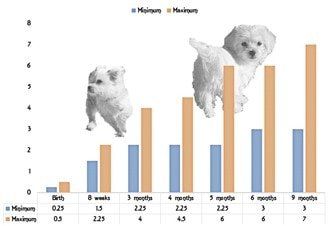Have you ever wondered how big your Maltese will grow? Despite their small size, these adorable dogs can surprise you with their potential for growth. While Maltese are known to be small, their size can vary depending on various factors such as genetics, diet, and exercise. So, how big will your Maltese get? Let’s find out!
The size of a fully grown Maltese can range from 4 to 7 pounds on average. However, it’s important to remember that individual dogs may vary slightly from this range. The size of a Maltese can be influenced by factors such as their bloodline and parents’ size. Additionally, the care you provide, including proper nutrition and exercise, can also impact their growth. So, while Maltese are generally small in size, their final size can be influenced by a combination of genetics and how well you take care of them.
Curious about the size of your Maltese? While every dog is unique, the average height for a fully grown Maltese is 8-10 inches and the average weight is around 4-7 pounds. However, keep in mind that genetics, diet, and exercise can also play a role in their size. Provide your furry friend with a balanced diet and regular exercise to help them grow to their full potential!

How Big Will My Maltese Get? Understanding the Size of Your Pet
As a proud owner of a Maltese, you might be wondering, “How big will my Maltese get?” Understanding the size of your pet is essential for proper care, choosing the right accessories, and managing your expectations. While each Maltese is unique and individual genetic factors can influence their size, there are some general guidelines to help you estimate the size of your furry companion. In this article, we will explore the factors that determine the size of a Maltese and what you can expect based on those factors.
Factors Influencing the Size of a Maltese
Several factors can influence the size of a Maltese, including genetics, nutrition, healthcare, and exercise. Genetics play a significant role, as the size of the parents and other ancestors can impact the growth of the offspring. If your Maltese’s parents were on the smaller side, it is likely that your dog will also be small. However, keep in mind that there can be variations within a litter.
Nutrition is another vital factor in determining the size of your Maltese. Feeding your furry friend a balanced and appropriate diet will support healthy growth. On the other hand, underfeeding or overfeeding can lead to stunted growth or obesity, respectively. It is crucial to consult with your veterinarian to determine the right portion sizes and feeding schedule for your Maltese.
Proper healthcare also plays a role in the size of a Maltese. Regular visits to the vet, vaccinations, and preventive treatments for parasites help ensure your pet is in good health. Any underlying health issues or improper medical care can potentially impact their growth and overall size. By prioritizing your Maltese’s healthcare needs, you can help them reach their optimal size.
Estimating the Size of Your Maltese
Estimating the final size of your Maltese can be challenging, but there are some general guidelines based on the age and weight of your pet. Typically, Maltese puppies will experience their most significant growth spurt in the first six months of life. After that, their growth rate slows down, and they will continue to gain weight at a more gradual pace.
On average, a fully grown Maltese will weigh between 4 to 7 pounds. However, it’s important to note that there can be variations, and some Maltese may be slightly smaller or larger. You can estimate your Maltese’s adult weight by doubling their weight at 12 weeks of age. Alternatively, you can multiply their weight at 6 months by 1.5. These calculations provide a rough estimate, but remember that individual genetic factors and other influences may affect the final size.
Keep in mind that the height of a Maltese is not the primary indicator of their size. While they are considered a toy breed, their height can vary. Generally, a fully grown Maltese will stand between 7 to 9 inches at the shoulder.
Caring for a Small-Sized Maltese
If your Maltese falls on the smaller side of the average size range, you may need to take some additional precautions to ensure their well-being. Here are a few tips for caring for a small-sized Maltese:
- Handle with care: As a small and delicate breed, Maltese dogs are more prone to injuries. Be gentle when interacting with your pet and avoid rough play or activities that may cause harm.
- Watch their weight: Small dogs can be more prone to obesity, which can lead to a range of health problems. Ensure your Maltese maintains a healthy weight through balanced nutrition and regular exercise.
- Keep them warm: Smaller dogs are more susceptible to cold temperatures. Consider using sweaters or coats during chilly weather to keep your Maltese comfortable and protected.
- Provide appropriate exercise: While small in size, Maltese dogs still require regular exercise to stay healthy and happy. Engage in activities that suit their size and energy levels, such as short walks or indoor play sessions.
Benefits of a Small-Sized Maltese
While the size of a Maltese can vary, there are several benefits to owning a small-sized dog:
- Portability: Small-sized Maltese are easier to carry and transport, making them great companions for traveling or running errands.
- Indoor living: Their compact size makes them well-suited for apartment or condo living, as they do not require much space.
- Less food consumption: Smaller dogs generally require smaller portions of food, which can be more cost-effective in the long run.
- Easy to groom: With their petite size, grooming a small-sized Maltese is less time-consuming and more manageable than larger breeds.
Conclusion
Understanding the factors that influence the size of a Maltese and estimating their potential size can help you provide the best care for your pet. While genetics, nutrition, healthcare, and exercise play a role, it’s important to remember that each Maltese is unique, and there can be variations even within the same litter. By focusing on their overall health and well-being, you can ensure that your Maltese thrives, regardless of their size.
Key Takeaways
- Maltese dogs are small in size, typically weighing between 4 to 7 pounds.
- Most Maltese dogs reach their full height of around 8 to 10 inches at the shoulder.
- Maltese puppies grow quickly in their first year and then continue to grow at a slower rate.
- Genetics play a significant role in determining a Maltese dog’s final size.
- Providing a balanced diet, regular exercise, and proper care can help ensure your Maltese reaches its full potential size.
Frequently Asked Questions
Today, we will be addressing some common questions pet owners have about the growth of their Maltese dogs. Read on to find answers to your burning questions!
1. When do Maltese dogs stop growing?
Maltese dogs generally reach their full adult size between 9 and 12 months of age. However, growth rates may vary between individual dogs. It is important to note that while their height may not increase after this period, they may still fill out and gain weight until they reach their adult size.
During the growth phase, it is crucial to provide your Maltese with proper nutrition and exercise to support their healthy development. Regular vet check-ups can help ensure they are on track and growing as expected.
2. How big will my Maltese get?
Maltese dogs are considered small breed dogs and typically weigh between 4 to 7 pounds (1.8 to 3.2 kilograms) when fully grown. In terms of height, they usually stand between 8 to 10 inches (20 to 25 centimeters) at the shoulder.
Genetics play a significant role in determining the final size of your Maltese. If both parents are small-sized Maltese, it is more likely that your dog will also be small. However, individual variation is still possible, so it is important to keep track of your Maltese’s growth through regular check-ups with your veterinarian.
3. How can I estimate the adult size of my Maltese?
While it is challenging to accurately estimate the adult size of your Maltese puppy, there are a few indicators you can consider. Firstly, take a look at the size of the parents. If both parents are small, it is more likely that your puppy will also be small when fully grown. Additionally, if your puppy is already on the smaller end of the weight and height spectrum compared to its littermates, it may indicate that it will be smaller as an adult.
However, it is important to remember that these are just rough estimates and there can still be individual variations. Regular check-ups with your veterinarian can help monitor your puppy’s growth and ensure they are healthy.
4. Are there any factors that can affect the growth of my Maltese?
Several factors can influence the growth of a Maltese dog. Proper nutrition is key during the growth phase, as a well-balanced diet contributes to healthy development. Avoid overfeeding your Maltese, as excessive weight gain can put stress on their joints and lead to health problems.
Genetics also play a significant role in determining the size of your Maltese. If both parents are small, it is more likely that your dog will be small as well. Additionally, overall health and any underlying medical conditions can impact growth. Regular vet check-ups, a healthy diet, and proper exercise will all contribute to your Maltese reaching their full potential.
5. How can I ensure my Maltese grows up to be healthy?
To ensure your Maltese grows up to be healthy, provide them with a well-balanced diet specifically formulated for small breed dogs. Regular exercise is also important to maintain their overall fitness and prevent obesity.
In addition, regular veterinary check-ups are crucial to monitor their growth, detect any potential health issues, and update their vaccinations. Remember to maintain a loving and nurturing environment for your Maltese, providing them with mental stimulation and social interaction, which is essential for their overall wellbeing.
By following these guidelines and providing proper care, you can help your Maltese grow up to be a healthy and happy companion.

Summary
So, how big will your Maltese get? Well, it depends on a few factors. Generally, Maltese dogs tend to reach a height of around 8-10 inches and a weight of 4-7 pounds when fully grown. However, each dog is unique, and genetics can play a role in determining their size. Remember, proper nutrition, exercise, and healthcare also contribute to your Maltese’s growth and overall well-being. Keep in mind that the love and companionship they offer is not measured by their size, but by the size of their heart.
In conclusion, while there is a general range for the size of Maltese dogs, individual factors and care can affect their ultimate size. Ultimately, it’s important to focus on the love and joy your Maltese brings to your life, regardless of their size.
